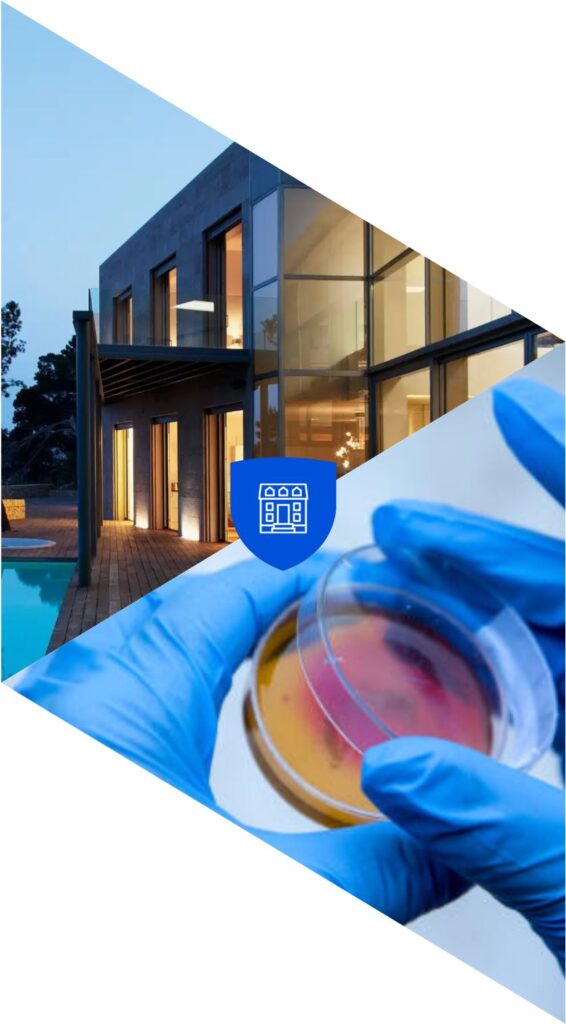Bluepoint Environmental offers a variety of microbial remediation consultation services so that we can assist you in identifying, assessing, and answering questions you have about microbial contamination and its impact on indoor air quality.
Introduction to Mold
Molds are tiny microscopic organisms that digest organic matter and reproduce by releasing spores. Molds are a type of fungi and there are over 100,000 species. In nature, mold helps decompose or break-down leaves, wood and other plant debris. Molds become a problem when they go where they are not wanted and digest materials such as our homes. Mold enters the home as microscopic airborne spores, from a variety of sources. It is important to know that mold needs moisture to grow. Controlling mold is a matter of controlling the moisture in the home. You know you have mold when you smell a musty odor or see small black, darkened, or white specks along a damp bathroom, basement, or other walls.2 Molds do not generally affect healthy individuals, however those with allergies or asthma may be more sensitive and develop reactions to mold. Mold-sensitive people (and those with prolonged mold exposure) may experience hay-fever type symptoms including: coughing, skin rash, running nose, red eyes, nasal congestion, and aggravation of asthma or difficulty breathing. Also, individuals with immune system suppression, lung diseases, are at increased risk for infection from molds. For more information see Health Effects of Indoor Air Pollution – Molds
MICROBIAL (MOLD) CONTAMINATION



Bluepoint Environmental follows a unique multidisciplinary approach to resolving mold problems in commercial and residential properties.
Microbial (Mold) Contamination Assessments
Bluepoint Environmental will perform a thorough inspection of property including a moisture intrusion assessment, bioaerosol (air) and surface sampling, and relative humidity testing to assess whether contamination exists within the property. This is especially useful for real estate purchasing – reduce the risk for acquiring properties with non-visible mold contamination problems.
Microbial (Mold) Contamination Remediation Project Design
BPE will develop site specific protocols for mitigating mold contamination problems. BPE will develop engineering control recommendations to minimize the potential for recontamination once the remediation is complete.
Mold Remediation Project Management
Supervisory management of mold remediation projects to verify that proper mold remediation procedures are being followed by the remediation contractor, verify containment integrity throughout the project, monitor negative pressure differentials within the containment area, verify proper use of PPE and decontamination procedures and enforce strict adherence to the scope of the remediation project specifications.
Mold Remediation Clearance Testing
BPE will provide independent, third party testing and inspection of properties after the remediation is completed. This includes a detailed review of the procedures, inspection of the property for residual contamination, moisture intrusion assessment, and bioaerosol and surface sampling.
Mold Remediation Worker and Supervisor Training
Intense 2 and 3 day courses covering all of the facets of mold remediation including: health effects of fungi, Personal Protective Equipment (PPE), containment construction processes, negative pressure systems and HEPA air scrubbing procedures, decontamination procedures, remediation protocol interpretation, visible vs. hidden mold implications, media blasting (cryoblasting, etc.) techniques, mold remediation guidelines and pending regulations.
HVAC Contamination
Even regularly maintained HVAC systems can develop mold issues and in-fact these contaminants are often missed by technicians because they lack the training and experience to identify the conditions that are most conducive to mold and microbial growth.
Mold Awareness and Information Seminars
Customizable seminars dealing with mold contamination issues in homes and commercial properties. Targeted for building owners and property managers, real estate representatives, property management companies, insurance companies, and remediation contractors. Includes information on preventing mold contamination, early detection to prevent large and costly contamination, general health effects of fungi, issues on contamination in non-occupied spaces such as attics and crawlspaces, and mold remediation guidelines and pending regulations.
Clean Room Testing
BPE will perform ISO 14644-1:1999(E) testing of pharmaceutical facilities, Biosafety III laboratories, operating rooms and intensive care units, and various manufacturing facilities.
More Info: Request a Consultation
For more information, or to request a professional mold consultation:
MOLD RESOURCES
- What is Mold?
- Health Effects of Mold
- Solutions to Mold/Moisture Contamination
- Mold Cleanup: Remediation, Removal
- Moisture and Mold Prevention Control Tips
- More Mold Testing and Analysis information
- Mold Cleanup Guidelines (EPA)
- Mold Remediation, Cleanup (NYC DOH)
- Mold Remediation and Cleanup Fact Sheet (New York DOH)
- A Brief Guide to Mold, Moisture, and Your Home (EPA)
- Mold Remediation in Schools and Commercial Buildings (EPA)
